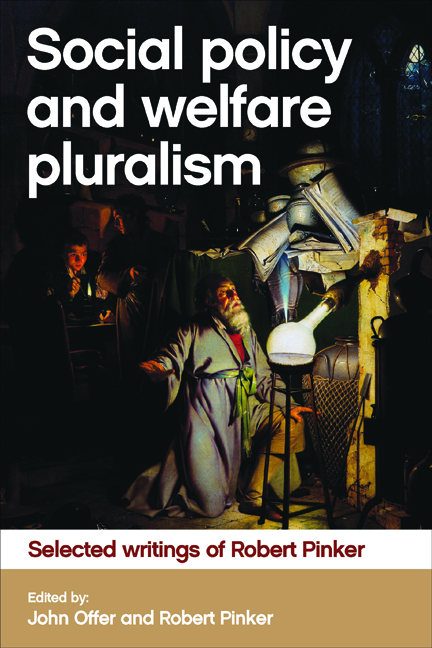Book contents
- Frontmatter
- Contents
- Acknowledgement
- Preface
- General introduction: Robert Pinker on rethinking approaches to welfare
- Introduction to Part One On social policy studies
- one The ends and means of social policy: a personal and generational perspective
- two Social theory and social policy: a challenging relationship
- three Stigma and social welfare
- four The welfare state: a comparative perspective
- five Richard Titmuss and the making of British social policy studies after the Second World War: a reappraisal
- Introduction to Part Two On social care, communities and the conditions for well-being
- six Report of the Working Party on the Role and Tasks of Social Workers: an alternative view
- seven The quest for community: from the Settlement Movement to the Griffiths Report: an historical perspective
- eight Citizenship, civil war and welfare: the making of modern Ireland
- Introduction to Part Three On welfare pluralism
- nine Golden Ages and welfare alchemists
- ten From gift relationships to quasi-markets: an odyssey along the policy paths of altruism and egoism
- eleven The experience of citizenship: a generational perspective
- twelve The right to welfare
- thirteen The prospects for social policy in the UK after the 2015 General Election
- Afterword On the post-Brexit prospects for social policy in the UK
- References
- Index
six - Report of the Working Party on the Role and Tasks of Social Workers: an alternative view
Published online by Cambridge University Press: 08 April 2022
- Frontmatter
- Contents
- Acknowledgement
- Preface
- General introduction: Robert Pinker on rethinking approaches to welfare
- Introduction to Part One On social policy studies
- one The ends and means of social policy: a personal and generational perspective
- two Social theory and social policy: a challenging relationship
- three Stigma and social welfare
- four The welfare state: a comparative perspective
- five Richard Titmuss and the making of British social policy studies after the Second World War: a reappraisal
- Introduction to Part Two On social care, communities and the conditions for well-being
- six Report of the Working Party on the Role and Tasks of Social Workers: an alternative view
- seven The quest for community: from the Settlement Movement to the Griffiths Report: an historical perspective
- eight Citizenship, civil war and welfare: the making of modern Ireland
- Introduction to Part Three On welfare pluralism
- nine Golden Ages and welfare alchemists
- ten From gift relationships to quasi-markets: an odyssey along the policy paths of altruism and egoism
- eleven The experience of citizenship: a generational perspective
- twelve The right to welfare
- thirteen The prospects for social policy in the UK after the 2015 General Election
- Afterword On the post-Brexit prospects for social policy in the UK
- References
- Index
Summary
I am not able to sign the Report of the Working Party on the Role and Tasks of Social Workers. I have therefore written this note setting out the main reasons for my dissent. I am equally critical of the community social work model which has the support of the majority of the members and of Professor Hadley's neighbourhood, or patch model. If either model was adopted, I believe it would be detrimental to the quality of social work services in England and Wales.
I shall argue that these two community-based models share a common perspective with regard to the crucial issues of generalism and specialism, and hence with regard to the distinctive features of the role and tasks of professional social work, as well as the nature of accountability and its implications for resource allocation and the exercise of discretion. The two models differ mainly in degree on these issues. The supporters of the community social work model reach their conclusions by default, while the advocates of the neighbourhood, or patch model do so by intent. Both approaches are seriously flawed.
The main observable difference between the community social work model and the neighbourhood model described in the Report is that the former retains the area team as the working unit while the latter does not, and the size of its catchment area lies somewhere between those of the traditional client-centred model and the neighbourhood model. The average number of team members is not specified, but as a rule it would again be on the small side.
The Report states that the community social work approach calls for highly localised and smaller area teams, working more closely with local community networks and with a greater, if limited, degree of control over resources. Both community-centred models, it is argued, would greatly augment the flow of information about local needs. The roles of local authority social services staff would be more openly defined, and each team would have its own budget and a greater degree of autonomy and discretion. Both models recognise the need for some specialised social workers, but in the neighbourhood, or patch model they will be located away from the frontline teams in some unspecified ‘second tier’.
- Type
- Chapter
- Information
- Social Policy and Welfare PluralismSelected Writings of Robert Pinker, pp. 123 - 146Publisher: Bristol University PressPrint publication year: 2017



